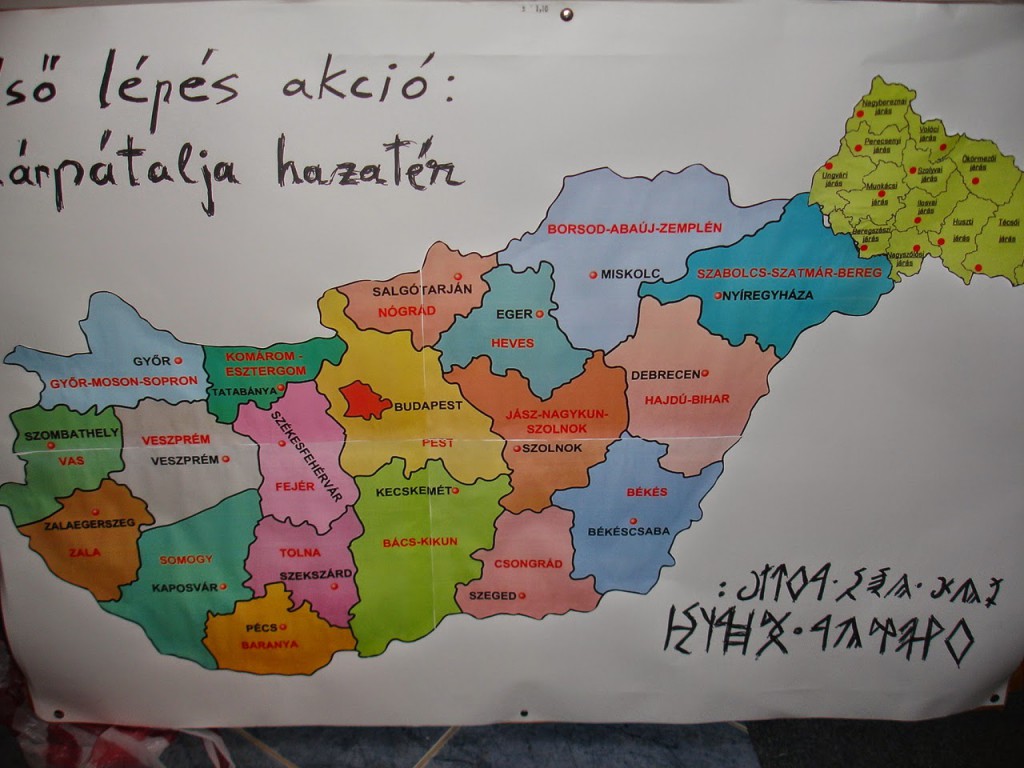The https://english.atlatszo.hu use cookies to track and profile customers such as action tags and pixel tracking on our website to assist our marketing. On our website we use technical, analytical, marketing and preference cookies. These are necessary for our site to work properly and to give us inforamation about how our site is used. See Cookies Policy
The role of Hungary’s far right in destabilising Ukrainian unity
Since the peace treaties following the end of World War 1, Hungary was left with an on-going ambivalence towards the ethnic groups separated from the majority population. In fact, radicals have never completely given up on the prospect of revising the borders and making the nation “whole” again. The recent Russian aggression in the Ukraine has given fuel to revisionist drives and mobilized Hungary’s flourishing far right.
The western region of Ukraine contains a significant Hungarian minority, mainly from the rearrangement of borders after the Trianon peace treaty which concluded World War I. The deal severely restricted Hungarian territories and divested it of valuable lands and natural resources. It is still considered by many Hungarians as a traumatic event that has limited the development of the country. Whether this is true or not is debatable, but undoing the Trianon treaty is nonetheless a central concern for many radical groups which today remain committed to reuniting the separated lands populated by Hungarians.

Russian president Vladimir Putin’s aggression in Ukraine raised hopes among some groups of reaching a deal that could reattach the former areas of Hungary.
This is supported by Putin’s efforts to incite the separatists among the local Rusyn minority to destabilize Ukraine in any way possible, which is only augmented by existing local tensions aggravated by poverty and migration.
In light of recent events there have been several proposals to settle the standing of western Ukraine. These include the creation of a Rusyn Republic, to setting up a Rusyn – Hungarian autonomy. The most extreme option was endorsed by Hungary’s radical right Jobbik party, which is currently Hungary’s second-most popular political group. The solution would mean annexing western Ukraine through military force, thereby inevitably involving Hungary in a war.
Jobbik has actually spent years laying the groundwork for its campaign, a look back at the party’s efforts in the past years show extensive network-building in local churches and colleges as well as creating ties with local Hungarian organizations. Jobbik often handpicked institutions which it went in to support financially, in return asking for the chance to recruit from among students.
The locals reacted adversely to Jobbik’s efforts to stoke nationalist sentiment among the ethnic Hungarians, which led to a number of altercations that may or may not have been rooted in mutual hostility based on nationality.
Ultimately, the ties all lead back to Russia, with a clear path between officials, a former KGB agent in Jobbik and a curious source of financing that has essentially made Hungary’s biggest and loudest nationalist party a proxy for Vladimir Putin who is happy to take every opportunity to destabilize Ukraine with the hopes of promoting his geopolitical interests.
Share:
Your support matters. Your donation helps us to uncover the truth.
- PayPal
- Bank transfer
- Patreon
- Benevity
Support our work with a PayPal donation to the Átlátszónet Foundation! Thank you.
Support our work by bank transfer to the account of the Átlátszónet Foundation. Please add in the comments: “Donation”
Beneficiary: Átlátszónet Alapítvány, bank name and address: Raiffeisen Bank, H-1054 Budapest, Akadémia utca 6.
EUR: IBAN HU36 1201 1265 0142 5189 0040 0002
USD: IBAN HU36 1201 1265 0142 5189 0050 0009
HUF: IBAN HU78 1201 1265 0142 5189 0030 0005
SWIFT: UBRTHUHB
Be a follower on Patreon
Support us on Benevity!

